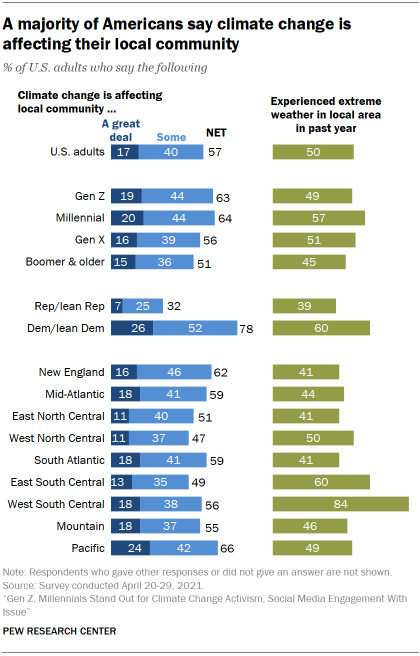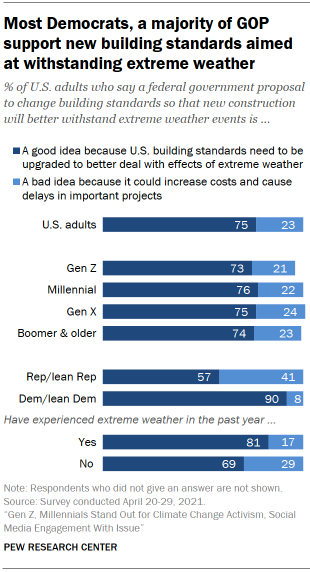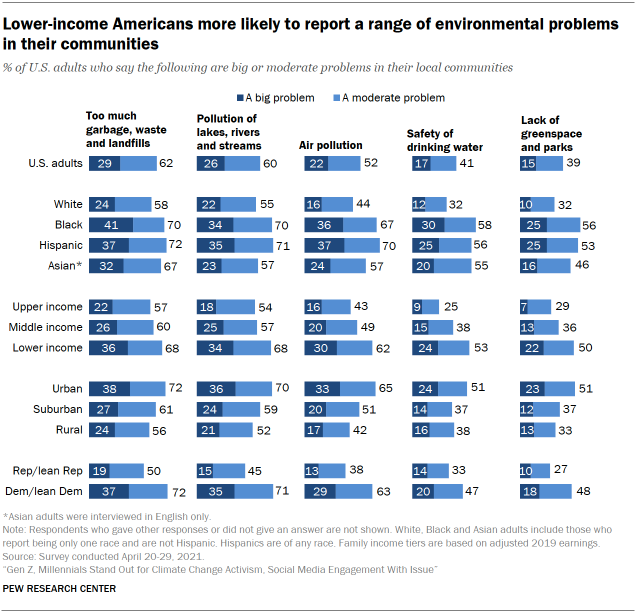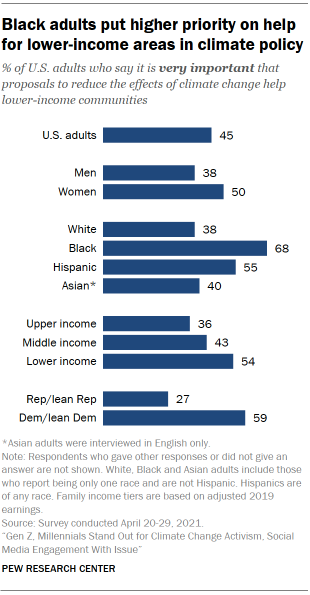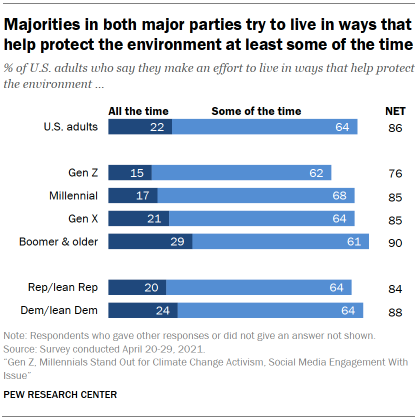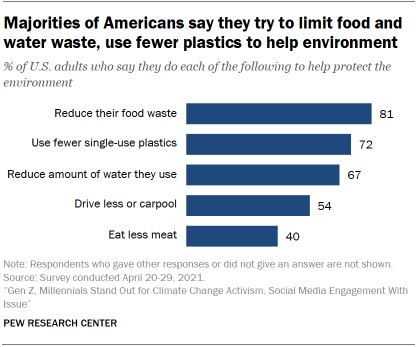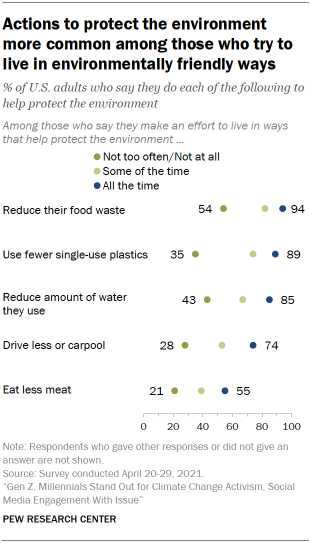A majority of Americans say climate change is having at least some impact on their local community, and half say their area has experienced extreme weather over the past year, particularly those living in South Central states such as Texas and Alabama. On a related policy question, a large majority of Americans favor the idea of revising building standards so new construction can better withstand extreme weather events.
At the local level, experience with environmental problems – such as air and water pollution – varies across groups. Black and Hispanic adults are particularly likely to say they experience environmental problems in their local community, as are those with lower family incomes.
And when it comes to climate policy considerations, large majorities of Black and Hispanic adults – across income levels – say it’s very important to ensure that lower-income communities benefit from proposals aimed at reducing the effects of climate change.
More than half of U.S. adults say they have seen at least some local effects of climate change
Overall, 57% of U.S. adults say climate change is affecting their own community either a great deal (17%) or some (40%). Smaller shares say climate change is affecting their community not too much (27%) or not at all (15%).
Most Americans, including a majority of Republicans, say human activity plays at least some role in climate change
Most Americans (77%) say human activity contributes either a great deal (44%) or some (33%) to global climate change. Far fewer (22%) say human activities such as the burning of fossil fuels contribute not too much or not at all to climate change.
Republicans continue to be less likely to believe that human activity plays at least some part in global climate change. Still, 59% of this group says human activity contributes at least some, while 40% say human activity has not too much of a role or no role in climate change.
Democrats across generations are in broad agreement that human activity has at least some effect on climate change. Among Republicans, Gen Zers and Millennials are more likely than Gen X and Baby Boomer and older adults to see human activity as playing a role in global climate change. See the Appendix for details.
The overall share of Americans who say their area is affected a great deal by climate change is down 7 percentage points, from 24% a year ago to 17% today.
Americans’ beliefs about local impact of climate change are more closely linked to their partisanship than to where they live. Perceptions of local climate impact vary modestly across census regions. The regions that are relatively likely to say climate change is impacting their communities, such as New England and the Pacific, tend to be places that lean Democratic in their political affiliation. There are also modest differences by generation in beliefs about its local impact.
A separate question in the survey finds that half of Americans say their local area experienced an extreme weather event in the past 12 months.
A large majority (84%) in the West South Central region say they have experienced extreme weather in the last 12 months. The region was impacted by a severe winter storm in February that led to a power crisis in Texas. In contrast to the overall partisan differences seen on this question, comparable majorities of Republicans and Democrats in the West South Central region report their communities have experienced extreme weather in the past year.
Wide public support for revised building standards to protect against extreme weather
Climate change is thought to be a key factor in the occurrence of more frequent and intense or extreme weather events. When asked about a federal government proposal to change building standards so that new construction will better withstand extreme weather events, 75% of U.S. adults responded in favor of this proposal, while 23% said it is a bad idea because it could increase costs and cause delays in important projects.
There is near consensus among Democrats and Democratic-leaning independents (90%) that revising building standards so construction better withstands extreme weather is a good idea. A 57% majority of Republicans and GOP leaners agree, although support is considerably higher among moderate and liberal Republicans (71%) than conservative Republicans (50%).
People who report direct experience with extreme weather in the past year are particularly likely to consider this a good idea (81% vs. 69% of those who do not report recent experience with extreme weather).
Black, Hispanic and lower-income adults more likely to report living in areas with big problems when it comes to air pollution, other environmental concerns
Overall, about six-in-ten Americans say they see at least moderate problems where they live when it comes to an excess of garbage (62%) and water pollution in lakes, rivers and streams (60%). About half (52%) say the same about local air pollution, and about four-in-ten say safe drinking water (41%) or a lack of greenspace (39%) are at least moderate problems.
Past research has found that Black, Hispanic and Asian American communities are more likely to be exposed to air pollution and other environmental hazards in their local area.
The Center survey finds Black and Hispanic adults particularly likely to say their local communities are having problems across this set of five environmental issues, and they stand out for the large share who consider these to be “big problems” where they live. About four-in-ten Black (41%) and Hispanic (37%) adults say the amount of garbage, waste and landfills in their community is a big problem. Black and Hispanic adults are also more likely than White adults to report that their community has big problems with air and water pollution, drinking water safety and a lack of greenspace and parks. A majority of Black (57%) and about half of Hispanic adults (53%) consider at least one of these five issues a big problem in their local area.
Lower-income Americans are also more likely to report that their area has big problems with these environmental issues. For example, about three-in-ten lower-income adults say their local community has a big problem with air pollution. About half as many upper-income adults (16%) say the same about their community. Half of those with lower family incomes say their local communities are having a big problem with at least one of these five environmental issues.
The Biden administration has brought a new focus to environmental justice concerns underlying climate and energy policy. Biden has called for $1.4 billion in his recent budget proposal for initiatives aimed at helping communities address racial, ethnic and income inequalities in pollution and other environmental hazards.
As Americans think about proposals to address climate change, Black (68%) and Hispanic adults (55%) stand out for the high shares who say it is very important to them that such proposals help lower-income communities.
More than half of lower-income Americans (54%) say this is very important to them, compared with 36% of upper-income adults.
Middle- and upper-income Black adults (70%) are about as likely as lower-income Black adults (66%) to say this is very important to them, however. Similarly, there are no differences on this question between middle/upper income Hispanic adults and those with lower incomes (54% vs. 57%, respectively).
A majority of Democrats and independents who lean toward the Democratic Party (59%) say it is very important to them that climate change proposals help lower-income communities; far fewer Republicans and Republican leaners (27%) say this.
Older Americans are more likely to say they regularly try to live in ways that help the environment
A large majority of Americans (86%) say they try to live in ways that help protect the environment all the time (22%) or some of the time (64%). Just 14% say they never or rarely make such an effort. These findings are largely unchanged since the question was last asked in October 2019.
In contrast to views and behaviors related to climate change, Baby Boomer and older adults are more likely than those in younger generations to say they try to live in environmentally conscious ways all the time (29%, vs. 21% in Gen X, 16% of Millennials and 15% in Gen Z).
And, unlike views on many policy issues related to the environment, similar shares of Democrats (88%) and Republicans (84%) say they make an effort to do this at least some of the time.
Majorities of U.S. adults say they take some everyday actions in order to help protect the environment, including reducing their food waste (81%), using fewer plastics that cannot be reused such as plastic bags, straws or cups (72%) or reducing the amount of water they use (67%). More than half of Americans (54%) say they drive less or carpool to help the environment, and 40% say they eat less meat.
About one-in-five adults (18%) say they do all five of these activities to help the environment, a similar share to when these questions were last asked in October 2019. On average, Americans do 3.3 of these activities.
People who say they try to be environmentally conscious all the time are much more likely to say they are doing specific things to protect the environment. For instance, a large majority (89%) of people who make an effort to live in ways that help protect the environment all the time say they use fewer single-use plastics such as bags and straws in order to protect the environment. This compares with 35% of those who say they do not or don’t often make an effort to protect the environment.


